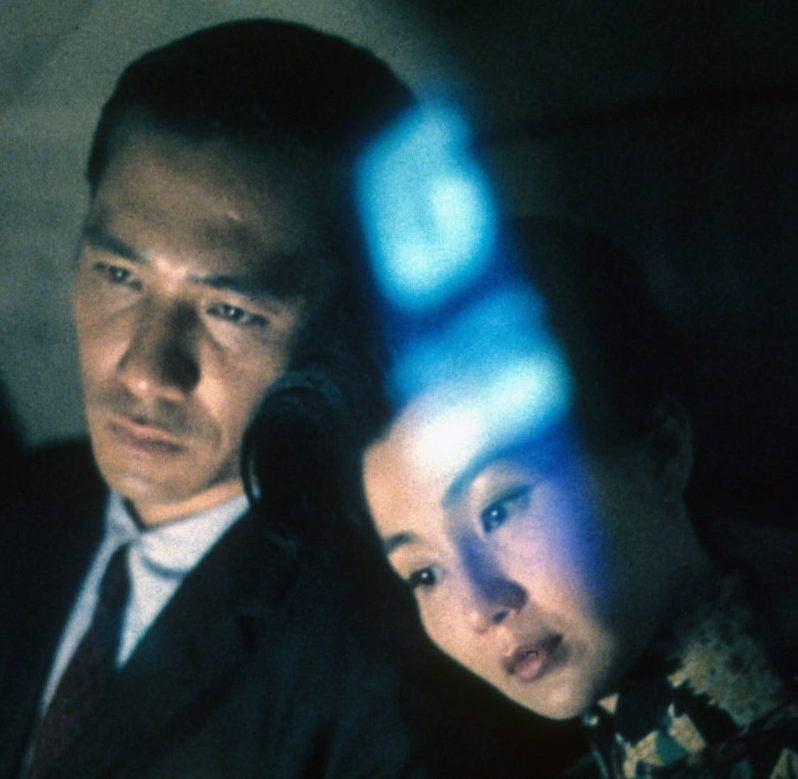 The intimate non-affairs of Wong Kar Wei’s two great films, shot in a uniquely futuristic palette of colors, trace the playful, exceedingly charming but tragically brief connections that two people can have. In the Mood for Love explores its deeply connected couple in an unusual way: when they realize their often absent spouses are having an affair, they role-play various scenarios as their spouses, correcting each other to make the performances more accurate. It sounds theatrical and melodramatic, but it’s all presented on screen in a fragmented, improvisational style. Although they traverse cramped Hong Kong offices and apartments and find solace and moments of happiness sitting very close to each other, sharing meals and taxis, writing at the same desk, and acting out a love affair on the stages of barren, nighttime streets, the gulf created by their marriages, their own need to remain faithful to their spouses, and possibly their fear of ruining the romance, is vast, and a distinct, deliberate pacing heightens that distance. The longing of the characters to not be lonely is palpable, and it was clearly created more in the editing room than on the page. Did they fall in love for real? In a series of dreamy epilogues we see many conventional changes in their ordinary lives, but also hints that the love forged from the delicate affair persisted. The woman revisits her old home and sheds a tear. The man whispers a secret into an empty hole at Angkor Wat, which in the next shot is overgrown with grass. Wong Kar Wei wants us to think so.
The intimate non-affairs of Wong Kar Wei’s two great films, shot in a uniquely futuristic palette of colors, trace the playful, exceedingly charming but tragically brief connections that two people can have. In the Mood for Love explores its deeply connected couple in an unusual way: when they realize their often absent spouses are having an affair, they role-play various scenarios as their spouses, correcting each other to make the performances more accurate. It sounds theatrical and melodramatic, but it’s all presented on screen in a fragmented, improvisational style. Although they traverse cramped Hong Kong offices and apartments and find solace and moments of happiness sitting very close to each other, sharing meals and taxis, writing at the same desk, and acting out a love affair on the stages of barren, nighttime streets, the gulf created by their marriages, their own need to remain faithful to their spouses, and possibly their fear of ruining the romance, is vast, and a distinct, deliberate pacing heightens that distance. The longing of the characters to not be lonely is palpable, and it was clearly created more in the editing room than on the page. Did they fall in love for real? In a series of dreamy epilogues we see many conventional changes in their ordinary lives, but also hints that the love forged from the delicate affair persisted. The woman revisits her old home and sheds a tear. The man whispers a secret into an empty hole at Angkor Wat, which in the next shot is overgrown with grass. Wong Kar Wei wants us to think so.
All the same filmic elements are present in Chungking Express, the colors, the editing style, the charismatic players, scenes of eating, soundtrack motifs, and it also, in the same way, tracks the initiating events of two people meeting, which then coalesces into romantic, if ultimately unfulfilled, reveries that propel us along. The characters are always seeking something but finding nothing, except longing and emotional solitude. When E.M. Forster wrote “Only connect the prose and the passion, and both will be exalted, and human love will be seen at its height. Live in fragments no longer. Only connect…” he specifically wrote it about “the difficulty of connecting our ordinary, conventional personalities with our transgressive erotic desires” 1, but as a universal conceit it certainly works, too.
In A Room With a View, Forster concocted a fantasy love affair to fulfill the “only connect” edict. A young woman coming of age is challenged to see past her pompous fiancee for a passionate devotee of truth and beauty. It takes her quite a while to make her decision. The power of the novel and its filmed adaptation is in the extended disconnection of the two people we want to see get together. And whether their attraction is erotic or not is never actually shown. All three films share a look at deep yearning, often unrequited, the isolation of the soul or the monumental effort to break that isolation. All three lean on the interiority of characters, on their mysterious thought patterns and un-acted on desires. Wong Kar Wei’s less idealistic approach to romance suggests isolation is the norm, but an isolation that breeds personal euphoria and defines a way of being that leads to a peaceful soul.
More: A Cantopop Dream Girl’s First Film Reverie, Chungking Express: Electric Youth, David Bordwell on Chungking Express: Fast Forward, Now Pause, Barry Jenkins on Wong Kar-wai, In the Mood for Love: Haunted Heart, English Hearts and Italian Sunshine, 1. The Prose and the Passion: A New Life of E.M. Forster
